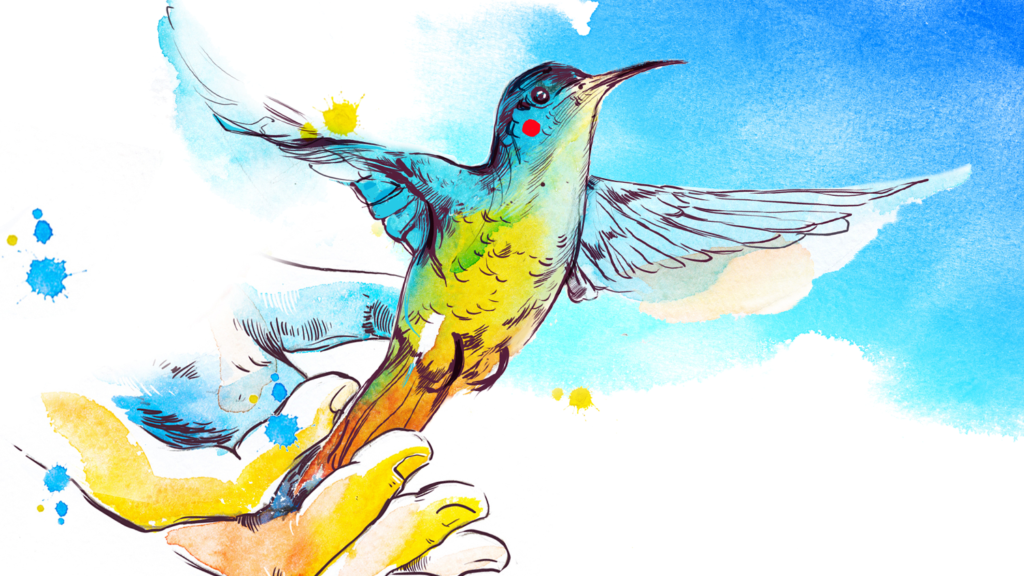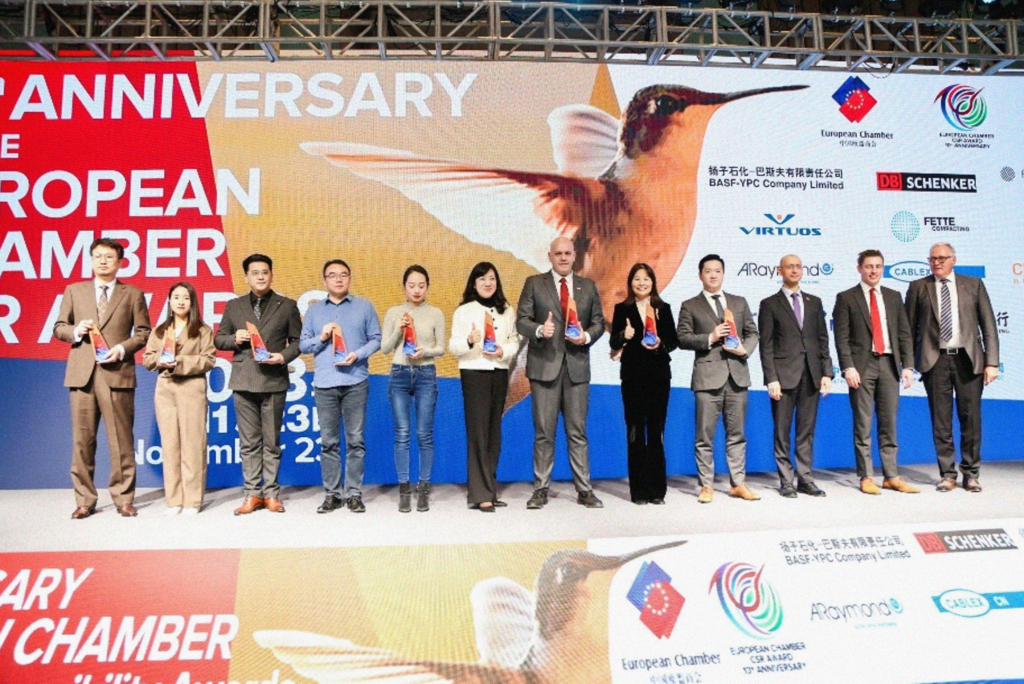
Celebrating the 10th Anniversary of the European Chamber CSR Awards
On 23rdNovember, the European Chamber hosted its 10th Corporate Social Responsibility (CSR) Awards event in Nanjing, with more than 170 participants attending to celebrate a decade of engagement in CSR promotion and advocacy. In this article, Chia-Lin Coispeau of Maverlinn Impact Innovation shares food for thought on the recent evolution of CSR amid major crises, and how European companies operating in China can play a leading role in designing strategies to foster future green growth in challenging and uncertain times.
From Crises to Opportunities
The 2008 financial crisis provided an opportunity to reflect on how our economic systems should be transformed. New concepts, such as creating shared value (CSV), emerged in 2011 when Harvard Business School academics Michael Porter and Mark Kramer invited all to “reinvent capitalism and unleash a wave of innovation and growth”.[1] They challenged the then dominant view of optimising short-term financial performance by proposing a more holistic long-term success approach for companies. Thus, other factors—such as the well-being of employees and customers, the viability of suppliers, the preservation of natural resources— began to be taken into account in the value creation process. The CSV concept aimed at reconciling business and societal progress. One early adopter of the new approach was Nestle, which included coffee farmers’ education and financial well-being in their shared-value strategy. In 2015, the United Nations (UN) Sustainable Development Goals (SDGs) provided companies and organisations with a global common implementation target framework.
The COVID-19 pandemic provided us with another opportunity to react, innovate and rethink our societal model and dominant growth paradigm. In January 2020, in Wuhan for example, emergency hospitals such as Leisheshan hospital, were built and completed in less than two weeks, with the help of companies—including European Chamber members—that provided the necessary technology and medical equipment to fight the virus.[2] Three years on, according to the World Bank, the world is still recovering from the disruptions to lives and welfare. For example, in 2020, global poverty rose for the first time since 1998. The pandemic led to massive job losses worldwide as global supply chains were disrupted and containment measures such as lockdowns and social distancing were introduced. The employment gap grew wider as the pandemic evolved, accentuated by the burden of childcare, with women and less-educated workers being hit the hardest. Learning inequalities, enhanced by school closures, increased the digital divide for lower income segments. However, according to the Organisation for Economic Co-operation and Development (OECD),[3] the pandemic also provided a transition to a more open and global biomedical science. From January to November 2020, 75 per cent of scientific publications on COVID-19 were open-source, compared to less than 50 per cent in other biomedical fields. The United States (US) accounted for the largest share, followed by China and the United Kingdom.
Finally, the decades-long climate concerns have lost none of their acuteness. The 6th Intergovernmental Panel on Climate Change (IPCC) report,[4] issued in March 2023 provided key scientific input for the Conference of the Parties (COP) 28 held in the United Arab Emirates, in order to help countries review their progress towards the Paris Agreement goals. The IPCC report stated that human activities are responsible for global warming over the past 200 years, leading to a current temperature rise of 1.1 degrees Celcius (°C) above pre-industrial levels, which has caused more frequent severe weather events and more destruction to people and the planet. However, the report notes that the 1.5°C limit is still achievable, and that by sharing best practices, technology, effective policy measures, and allowing sufficient funding, communities can reduce the most carbon-intensive activities. Moreover, it underlines that the largest gains in well-being could be obtained by focussing on actions for lower income and marginalised communities.

CSR today: the way forward
Today, we are finally acknowledging the extent of our complex interdependence and how a crisis can also be an opportunity for us to change, reform and innovate. The year 2023 marked a détente in US-China climate relations, and also witnessed the re-organisation of major economies’ supply chains in a geopolitical environment exacerbated by the wars in Ukraine and the Middle East. In China, for instance, according to the US Energy Information Association (EIA),[5] the average monthly crude oil imported in the first semester of 2023 peaked at 11.4 billions of barrel per day, a year-on-year increase of 12 per cent. In the COP28 preparatory meetings,[6] China reaffirmed that so long as renewable energy technologies could not guarantee a stable supply chain (including energy storage solutions), it would pursue its coal plant expansion plan. However, in line with its green and sustainable development strategy, China’s 14th Five-year Plan accelerates the decarbonisation of its economy with its 30/60 Goals to peak carbon dioxide emissions by 2030 and achieve carbon neutrality before 2060. During the 4th European Union-China High-level Environment and Climate Dialogue held in Beijing in July ,[7] environment and climate priorities were discussed as well as their respective frameworks, i.e. the European Green Deal and its related legislation as well as the Chinese 1+N policy framework – encompassing overarching decarbonisation guidance and the action plans for various sectors and industries.
At a micro-economic level, companies in China have been re-orientating their CSR strategies in the wake of the pandemic. Priority is being given to developing innovative, green and digitalised solutions, as well as working towards reaching “common prosperity” through more diversity, inclusion and poverty reduction.
In Europe, this October 2023, the Carbon Border Adjustment Mechanism (CBAM)[8] entered into application in its transitional phase, initially with a limited scope covering cement, iron and steel, aluminium, fertilisers, electricity and hydrogen. According to the EU, CBAM is its landmark tool to fight carbon leakage and one of the central pillars of its ambitious Fit for 55 Agenda. It will equalise the price of carbon between domestic products and imports. Likewise the new European directive on Corporate Sustainability Reporting (CSRD) and its mandatory European Sustainability Reporting Standards (ESRS) will gradually be applied from January 2024 and will impact at least 50,000 companies with operations in Europe, reinforcing the obligations for European companies and others to design and implement robust CSR strategies.
Some companies have already taken bold action and continuously drive change. They succeed in managing both complexity and uncertainty, using their creativity to design or support adaptive and innovative strategies that will ensure green economic growth, societal progress, and the creation of impactful innovation ecosystems—such as the Cartier Women’s Initiative(CWI).[9]
In conclusion, the green growth paradigm shift can only be realised through inclusive cooperation between political, business and society stakeholders. In this regard, European companies operating in China can and must play a key role.
Acknowledgements
Finally, we would like to take this opportunity to thank the European Chamber, the judges, the winners and all applicants, and the speakers of the 10th CSR awards for providing such an enriching platform.
The Chamber would like to thank the sponsors of this year’s CSR Awards: BASF-YPC Co Ltd, PULLMAN Hotel Nanjing Lukou, Virtuos China, ARaymond, Cablex, Club Med Nanjing, Fette Compacting, IFC and Maverlinn.
NOTE: This text is inspired by elements of speeches delivered during the European Chamber 10th CSR awards, in particular by Clare Pearson, director of International Development at DLA Piper, and Wang Li Wei, president of the China Development Foundation.
Chia-Lin Coispeau is partner at Maverlinn Impact Innovation, an advisory firm aimed at reducing social and environmental issues in China and Europe. Our team crafts innovative strategies to deliver superior value to industry leaders. Maverlinn is committed to promoting a model of humane development through constant attention given to personal empowerment and the common good.
[1] Michael E. Porter & Mark R. Kramer, Creating Shared Value: How to reinvent capitalism – and unleash a wave of innovation and growth, Harvard Business Review, January/February 2011, viewed 29th November 2023, <https://hbr.org/2011/01/the-big-idea-creating-shared-value>
[2] Siemens donates medical equipment worth RMB 15 million to support China’s combat against novel coronavirus, Siemens, 3rd February 2020, viewed 4th December 2023, <https://w1.siemens.com.cn/press/NewsDetail_en.aspx?ColumnId=9&ArticleId=10219>
[3] The pandemic has triggered an unprecedented mobilisation of the scientific community, OECD, viewed 29th November 2023, <https://www.oecd.org/sti/science-technology-innovation-outlook/crisis-and-opportunity/thepandemichastriggeredanunprecedentedmobilisationofthescientificcommunity.htm>
[4] AR6 Synthesis Report: Climate Change 2023, IPCC, 2023, viewed 29th November 2023, <https://www.ipcc.ch/report/sixth-assessment-report-cycle/>
[5] China imported record volumes of crude oil in the first half of 2023, EIA, 18th September 2023, viewed 29th November 2023, <https://www.eia.gov/todayinenergy/detail.php?id=60401>
[6] David Stanway, China climate envoy says phasing out fossil fuels ‘unrealistic’, Reuters, 22nd September 2023, viewed 29th November 2023, <https://www.reuters.com/sustainability/climate-energy/china-climate-envoy-says-phasing-out-fossil-fuels-unrealistic-2023-09-22/>
[7] Readout of the Fourth EU-China High-Level Environment and Climate Dialogue, European Commission, 4th July 2023, viewed 29th November 2023, <https://climate.ec.europa.eu/news-your-voice/news/readout-fourth-eu-china-high-level-environment-and-climate-dialogue-2023-07-04_en>
[8] Carbon Border Adjustment Mechanism (CBAM) starts to apply in its transitional phase, European Commission, 29th September 2023, viewed 29th November 2023, <https://ec.europa.eu/commission/presscorner/detail/en/ip_23_4685>
[9] Driving Change by Empowering Women Impact Entrepreneurs, Cartier Women’s Foundation, <https://www.cartierwomensinitiative.com/>


Recent Comments